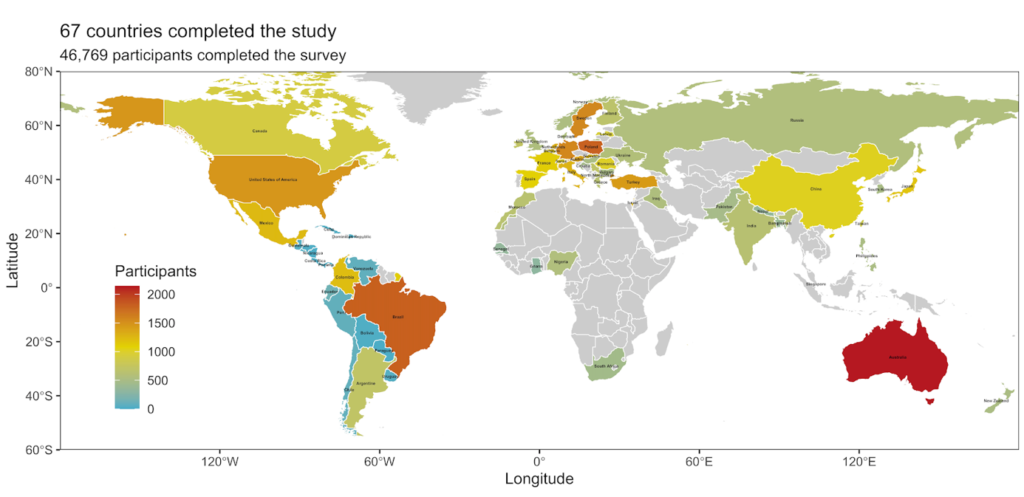By Hallgeir Sjåstad
Summary
In a massive international collaboration including more than 200 researchers, we examined the adoption of public health behaviors and support of public policy interventions during the first wave of the Covid-19 pandemic. Based on 45.000 participants from 67 countries, we found that individuals who identified more strongly with their nation reported greater engagement in public health behaviors (e.g., social distancing and improved physical hygiene) and greater support for public health policies (e.g., early lockdown of public gatherings and travel restrictions). This result was later replicated using aggregated behavioral data, in which countries with a strong sense of national identity showed a larger drop in physical movement patterns during the pandemic than other countries. The current research may illustrate the pro-social function of national group identity, as a potential motivator for public health support and rapid behavior change in times of crisis.
Introduction
As of June 2021, Covid-19 has caused more than 3 million deaths world-wide, with many more harmed indirectly through family members at risk, job loss, and future uncertainty. It is arguably the most severe pandemic since the “Spanish flu” a century ago (1918-1920). Currently, medically approved vaccines are being distributed with promising results, but until the vaccination rate reaches an acceptable level many countries remain in temporary “lockdown” or other forms of restrictive regulations. This means that for more than a year, the primary defense against the pandemic has been collective behavior change. It has therefore been of great importance to study these responses with empirical research methods, to offer both scientific analysis and future advice to policy-makers.
In the spirit of collaborative “team science”, I was part of a group of researchers who organized a global social science project to study the behavioral dimensions of the pandemic. The project was led by Jay Van Bavel at New York University in collaboration with Aleksandra Cichocka, Valerio Capraro, Mark Alfano, and Paulo Boggio. Just after a few weeks more than 200 researchers joined the project, which enabled a global data collection of more than 45,000 participants from 67 countries. Our primary goal was to study the role of psychological and social factors in how people across the world are responding to Covid-19. As outcome variables, all participants reported their behavioral health intentions (social distancing and physical hygiene), and their support for Covid-19 policies to reduce the spread of the virus (early lockdown interventions and restrictions of travel). The data collection took place in the first wave of the pandemic (March/April 2020).

Figure: Map of the 67 participating countries and territories with sample size scaled to color (grey areas = no data). The total sample included 46,769 participants (Van Bavel et al., 2021).
Results: The Role of National Identity
The results from our first paper from this project, which is currently undergoing peer review, show that national identity appears to play an important role in the public response to the pandemic. In short, we found that participants who identified more strongly and more positively with their nation consistently reported greater engagement in public health behaviors and greater support for public health policies. In a follow-up analysis we went beyond mere self-reports to study actual behavior, using Google data on physical mobility patterns, and replicated the main result at the country-level. That is, we found that countries with a strong sense of national identity showed a larger drop in physical movement during the pandemic (which should help reduce the spread of the virus), as compared to countries with a weaker sense of national identity.
The results suggest a pro-social function of national group identity, which from a theoretical point of view is far from obvious. In the decades following World War II, classic work in social psychology examined the destructive and sometimes dangerous dimensions of nationalism and leadership persuasion, such as the tendency to obey strong authorities in Stanley Milgram’s early work and group conformity to false beliefs in the work of Salomon Asch. The current research provides an important supplement and extension, by documenting the constructive potential of national identity in promoting greater support for public-health policies and collective behavior change during a pandemic.
Future Research
As the current work was based on correlational data, future studies should combine longitudinal designs with field experiments to get a better understanding of whether there is a causal relationship. It should also be carefully assessed whether appeals to a collective and inclusive “we” within each nation, a broader social identity, can promote further support for necessary behavior change during global pandemics and other crises requiring immediate action. For a broad review of the psychology and behavioral economics of cooperation and pandemic behavior change, please visit our recent book chapter.
Source: The working paper, “National identity predicts public health support during a global pandemic: Results from 67 nations”, is openly available and currently undergoing peer review.


